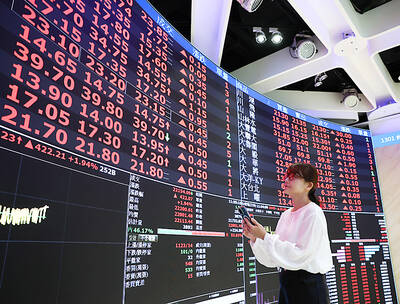Starting next month, Taiwanese consumers will be able to view real-time local TV programs on their laptops even when abroad, as long as they have a broadband connection.
This is made possible because Sony Taiwan Ltd is set to launch its latest LocationFree TV product here in the middle of next month, the firm's division president Hiroyuki Oda told reporters yesterday.
"Taiwan is one of the most important IT bases in Asia, and consumers here easily embrace new high-tech products," he said, explaining why Taiwan was chosen as the third country for Sony to introduce the product.
The product was first unveiled in early October in Japan and the US.
LocationFree TV enables people to watch television programs on the go. With a broadband connection, its base station can broadcast TV and content from devices such as DVD players or hard-disk recorders across the Internet to wherever viewers are.
"LocationFree TV will especially benefit Taiwanese citizens residing abroad, as they will be able to watch all the local TV programs, just as they do at home," Oda said.
He brushed aside concerns about competition from similar Internet TV services.
Real time
Internet TV offers selected programs and limited content for home viewers, but not real-time viewing from any location, he said.
Since the service has been well received by Japanese and US consumers, the Japanese firm expects the same response in Taiwan, Oda said, while declining to reveal target sales or available units.
The product is priced at NT$9,990 (US$299).
LocationFree TV will gradually become available in other European or Asian countries next year, but the timeframe for its release has not yet been finalized, he added.
In addition to computers, users of PlayStation Portable gaming consoles will be able to watch TV as well.
More audio and visual products such as personal digital assistants or phones will possibly be added as viewing devices for LocationFree TV in the future, Oda said.
LCD sales rise
In other news, Sony said local sales of its 32-inch liquid-crystal-display (LCD) TVs will rise above 3,000 units this month, a figure which would make it the top seller in the 32-inch LCD TV category.
"We sold more than 1,000 units of the 32-inch Bravia series in October, which made us the No. 2 seller in the category. As we are increasing production capacity of these TVs to accommodate strong local demand, sales will double this month," Oda said.
In late September Sony debuted the 32-inch series at NT$59,900, a price similar to local brands, in an attempt to regain its past market leadership.
As Sony aims to grab the top spot in the local LCD TV market next year, it will expand its products to entice more buyers, and may include a 45-inch lineup, he added.

UNCERTAINTIES: Exports surged 34.1% and private investment grew 7.03% to outpace expectations in the first half, although US tariffs could stall momentum The Chung-Hua Institution for Economic Research (CIER, 中華經濟研究院) yesterday raised its GDP growth forecast to 3.05 percent this year on a robust first-half performance, but warned that US tariff threats and external uncertainty could stall momentum in the second half of the year. “The first half proved exceptionally strong, allowing room for optimism,” CIER president Lien Hsien-ming (連賢明) said. “But the growth momentum may slow moving forward due to US tariffs.” The tariff threat poses definite downside risks, although the scale of the impact remains unclear given the unpredictability of US President Donald Trump’s policies, Lien said. Despite the headwinds, Taiwan is likely

READY TO BUY: Shortly after Nvidia announced the approval, Chinese firms scrambled to order the H20 GPUs, which the company must send to the US government for approval Nvidia Corp chief executive officer Jensen Huang (黃仁勳) late on Monday said the technology giant has won approval from US President Donald Trump’s administration to sell its advanced H20 graphics processing units (GPUs) used to develop artificial intelligence (AI) to China. The news came in a company blog post late on Monday and Huang also spoke about the coup on China’s state-run China Global Television Network in remarks shown on X. “The US government has assured Nvidia that licenses will be granted, and Nvidia hopes to start deliveries soon,” the post said. “Today, I’m announcing that the US government has approved for us

When Lika Megreladze was a child, life in her native western Georgian region of Guria revolved around tea. Her mother worked for decades as a scientist at the Soviet Union’s Institute of Tea and Subtropical Crops in the village of Anaseuli, Georgia, perfecting cultivation methods for a Georgian tea industry that supplied the bulk of the vast communist state’s brews. “When I was a child, this was only my mum’s workplace. Only later I realized that it was something big,” she said. Now, the institute lies abandoned. Yellowed papers are strewn around its decaying corridors, and a statue of Soviet founder Vladimir Lenin

The National Stabilization Fund (NSF, 國安基金) is to continue supporting local shares, as uncertainties in international politics and the economy could affect Taiwanese industries’ global deployment and corporate profits, as well as affect stock movement and investor confidence, the Ministry of Finance said in a statement yesterday. The NT$500 billion (US$17.1 billion) fund would remain active in the stock market as the US’ tariff measures have not yet been fully finalized, which would drive international capital flows and global supply chain restructuring, the ministry said after the a meeting of the fund’s steering committee. Along with ongoing geopolitical risks and an unfavorable